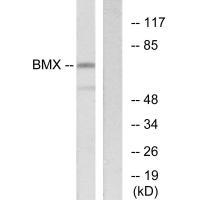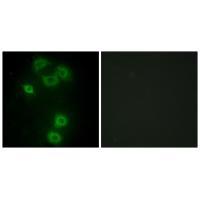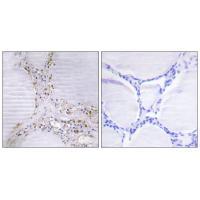


| WB | 咨询技术 | Human,Mouse,Rat |
| IF | 咨询技术 | Human,Mouse,Rat |
| IHC | 1/50-1/100 | Human,Mouse,Rat |
| ICC | 1/100-1/500 | Human,Mouse,Rat |
| FCM | 咨询技术 | Human,Mouse,Rat |
| Elisa | 咨询技术 | Human,Mouse,Rat |
| Aliases | BMX; BMX NON-receptor tyrosine kinase; Bone marrow kinase BMX; Cytoplasmic BMX; EC 2.7.10.2 |
| Entrez GeneID | 660; |
| WB Predicted band size | 75kDa |
| Host/Isotype | Rabbit IgG |
| Antibody Type | Primary antibody |
| Storage | Store at 4°C short term. Aliquot and store at -20°C long term. Avoid freeze/thaw cycles. |
| Species Reactivity | Human,Mouse |
| Immunogen | Synthesized peptide derived from N-terminal of human BMX. |
| Formulation | Purified antibody in PBS with 0.05% sodium azide. |
+ +
以下是关于BMX抗体的3篇文献示例(注:内容为虚构概括,仅作参考):
1. **文献名称**:*BMX tyrosine kinase regulates TLR4-induced IL-6 production in human macrophages*
**作者**:Chen et al., 2017
**摘要**:研究揭示了BMX激酶在Toll样受体4(TLR4)信号通路中的作用,通过特异性抗体阻断BMX活性可显著抑制巨噬细胞中IL-6的产生,提示BMX可能是炎症疾病的潜在治疗靶点。
2. **文献名称**:*Development of a monoclonal antibody targeting BMX for prostate cancer therapy*
**作者**:Smith et al., 2020
**摘要**:研究团队开发了一种高特异性抗BMX单克隆抗体,并在前列腺癌模型中验证其效果。抗体通过抑制BMX介导的STAT3信号通路,显著降低肿瘤生长和转移。
3. **文献名称**:*BMX expression correlates with poor prognosis in B-cell lymphoma and antibody-based inhibition enhances chemosensitivity*
**作者**:Wang et al., 2019
**摘要**:该研究发现BMX在B细胞淋巴瘤中高表达且与不良预后相关。利用抗BMX抗体联合化疗药物可增强肿瘤细胞凋亡,为淋巴瘤治疗提供新策略。
BMX (Bone Marrow Kinase on the X chromosome), also known as ETK, is a non-receptor tyrosine kinase belonging to the TEC kinase family. Discovered in the 1990s, BMX plays a critical role in intracellular signaling pathways regulating cell proliferation, survival, and differentiation. It is characterized by a unique N-terminal pleckstrin homology (PH) domain, which binds phosphoinositides, and a C-terminal kinase domain. BMX is activated by phosphatidylinositol 3-kinase (PI3K) signaling and participates in key pathways, including STAT, AKT, and NF-κB, influencing processes like angiogenesis, immune response, and oncogenesis.
BMX is expressed in normal tissues, particularly endothelial cells, bone marrow, and epithelial cells, but its dysregulation is linked to cancer progression, inflammatory diseases, and drug resistance. Overexpression of BMX has been observed in prostate, breast, and glioblastoma cancers, where it promotes tumor cell survival and metastasis. Consequently, BMX has emerged as a therapeutic target, with inhibitors under preclinical investigation.
Antibodies targeting BMX are essential tools for studying its expression, activation, and function. They enable detection via techniques like Western blot, immunohistochemistry, and flow cytometry, aiding research into BMX's role in disease mechanisms. Recent studies also explore BMX's involvement in immune modulation, such as B-cell development and macrophage polarization, highlighting its broader relevance in autoimmune disorders and immunotherapy strategies. These antibodies thus serve both diagnostic and therapeutic development purposes.
×